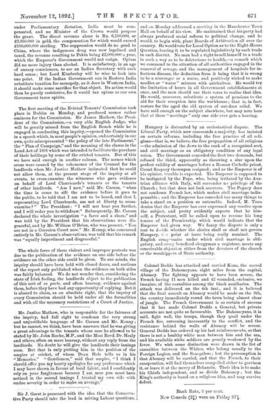Hungary is distracted by an ecclesiastical dispute. The Liberal Party,
which now commands a majority, has insisted on certain reforms, including the free practice of all reli- gions—that is, we believe, the free propagation of all religions —the admission of the Jews to the rank of a recognised sect, and civil marriage as an obligatory condition of any legal union. The Government conceded the first two demands, but refused the third, apparently as throwing a slur upon the perfect validity of marriages before a Roman Catholic priest. Count Szapary thereupon resigned ; and as the Emperor is of his opinion, trouble is expected. The Emperor is supposed to be instigated by the Pope, who, being irritated by the Aus- trian alliance with Italy, will surrender no privilege of the Church ; but that does not look accurate. The Papacy does not condemn French law, which makes civil marriage indis- pensable; and the Emperor has conceded too many things to take a stand on a position so untenable. Indeed, M. Tisza, denies that the Emperor has ever expressed any resolve upon the subject, and pretty evidently expects that he him- self, a Protestant, will be called upon to resume his long tenure of the Premiership, which would indicate that the Emperor had given way. We fancy the dispute is only a test to decide whether the clerics shall or shall not govern Hungary, tl e point at issue being really nominal. The English comromise under which civil marriage is obli- gatory, and every beneficed clergyman a registrar, meets any conceivable objection either from the devotees of the church or the worshippers of State authority.






































 Previous page
Previous page